Why Stacey Abrams Ran Behind Raphael Warnock
Discrimination? Issues? Incumbency?
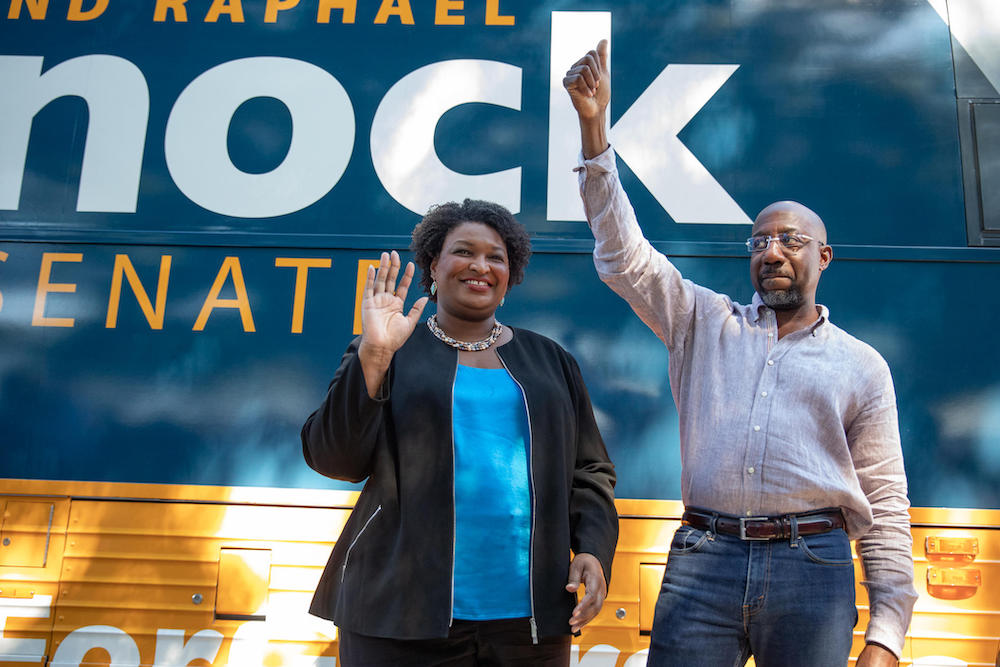
Writing at MSNBC, culture journalist Evette Dionne laments, “Stacey Abrams isn’t the first Black woman to not reap what she’s sowed.”
From what was predicted to be record-breaking voter turnout to the number of women running in gubernatorial races, the 2022 midterm elections were historic. However, for all the victories worth touting, a disappointing status quo that remains: America has never elected a single Black woman governor. Each of the three Black women who ran in this cycle — Stacey Abrams in Georgia, Deidre DeJear in Iowa, and Yolanda Flowers in Alabama — lost her race. It’s a disappointing result a mere two years after Joe Biden and Kamala Harris credited Black voters for securing their victory.
DeJear and Flowers were essentially placeholder candidates, running in impossible races against incumbent governors in deeply red states just to put a Democrat on the ballot. Their opponents got 58% and 67%, respectively.
More fundamentally, that there has never been a Black woman elected governor is hardly shocking. Jim Crow ended less than 60 years ago and women who weren’t placeholders for their husbands started routinely winning high office in my memory. The overlap, obviously, would be more unusual. And, even setting aside our long history of racism and sexism, Black women are maybe 6% of the population and a much smaller part of the elite classes that supply most of our high officials.
Though Black women voters are often called the “backbone of the Democratic Party,” winning statewide office is an uphill battle for Black women. That lip service doesn’t often translate to actual results, as we’re seeing in these three gubernatorial races.
Again: factoring sacrificial candidates for governor of Iowa and Alabama into this is just dishonest. Abrams was the only one of the three who could plausibly have won their race.
It’s an upsetting turn of events, especially since Abrams, a former Georgia state representative, is a rising force in Democratic politics. Not only did Biden consider her a potential running mate in 2020, but she’s also one of the architects of a new voter registration movement in Georgia and the broader South. Since 2014, the New Georgia Project and Fair Fight, two organizations that Abrams founded, have registered more than 500,000 new voters in the state while sounding the alarm about escalating attempts to suppress the vote.
And she’s been nominated twice for governor and came pretty close both times—in a historically red state against an opponent with a more traditional resume for the job. I don’t have deep knowledge of Georgia politics but, in most states, statewide office, not the state assembly, is the traditional path to the governor’s mansion.
There are several reasons Abrams has been unsuccessful in two gubernatorial races: While Georgia is becoming more progressive as its politics change with an influx of new residents, it’s still a Southern state with all the historical baggage that accompanies that designation. Is that population ready for a Black woman governor who is unmarried and childless? We may never know.
So now we’ve added two additional variables. It’s not just that she’s a Black woman but she’s unmarried and childless. How many unmarried white women have been elected governor? Unmarried white men?
Beyond that, Abrams focused on these underserved populations — as she planned to — and has turned them into a reliable voting bloc. That means addressing the issues that seemingly matter most to them, such as paying teachers more, extending funding for child care and preschool, increasing the amount of affordable housing available in Georgia and enshrining abortion rights. These are all progressive causes that should’ve driven voters to the polls for Abrams the same way they did for Sen. Raphael Warnock, the Black Democratic incumbent. Warnock, who won more votes than his Republican opponent and made the runoff Tuesday, campaigned to secure votes from independents.
Aha! It’s not just that the Black man who has twice gotten the most votes for Senate isn’t a woman but he’s also used a strategy designed to appeal outside the Democratic coalition in a Democratic-minority state. Hmm. Maybe that, not sex, should have been the lede?
Indeed, Dionne’s colleague, Sahil Kapur did just that in his October 18 report “Abrams and Warnock pursue very different strategies in key Georgia races.”
Democratic candidates in the two marquee Georgia races are blitzing the airwaves with television ads — and making two markedly different pitches to voters.
A new spot cut by Stacey Abrams, the Democratic nominee for governor, presents her as a “math whiz” with bold progressive ideas to raise teacher pay, extend child care and fund preschool. Another ad vows to put Georgia’s surplus toward fresh stimulus checks for the middle class and to expand affordable housing.
Meanwhile, Sen. Raphael Warnock is running as an independent-minded legislator and highlighting bipartisan pursuits like capping insulin costs as he seeks a full six-year term. One ad touts his work with Republican Sen. Tommy Tuberville of Alabama to protect peanut farmers. Another features testimonials from GOP-leaning voters who say they’re supporting Warnock this fall.
The ads reflect two diverging visions by Democrats about how to win Georgia, a former Republican bastion that narrowly voted for President Joe Biden and two Democratic senators in the 2020 election cycle. Abrams is relying heavily on mobilizing the base, aiming to inspire and register disaffected Georgians and turbocharge progressive turnout. Warnock is putting a greater emphasis on courting the center, appealing to soft Republicans and center-right independents, including white college graduates in the booming Atlanta area who feel out of sync with a GOP transformed by former President Donald Trump.
As early voting begins, polling averages show a notable split in partisan preferences: Warnock leads Republican challenger Herschel Walker by about 4 percentage points, while Abrams trails GOP Gov. Brian Kemp by roughly 5 points.
“They are running two very different campaigns,” said an adviser to Kemp, who was granted anonymity to candidly assess Democratic strategy. “It’s pretty obvious, watching their speeches and ads and their social media.”
Abrams is “not so much in the persuasion business; she’s in the mobilizing business,” the Kemp adviser said, attributing Warnock’s relative success in 2020 and his lead in this year’s race to his focusing on “middle-of-the-road policy positions,” like lowering prescription drug costs, and not emphasizing “some of these more left-leaning issues.”
A recent Quinnipiac University poll of likely Georgia voters found Warnock outperforming Abrams by 14 points among independents against their rivals. Among Republicans, Warnock had 7%, while Abrams had 3%. Among Democrats, both were equally dominant.
It’s quite possible that, despite her ability to draw attention to herself with the national press and organize voter registration drives, she’s just not a great candidate. At least for statewide office in Georgia.
Still, in fairness to Abrams, we’re talking about relatively small differences. Here’s the NYT summary of the two races:
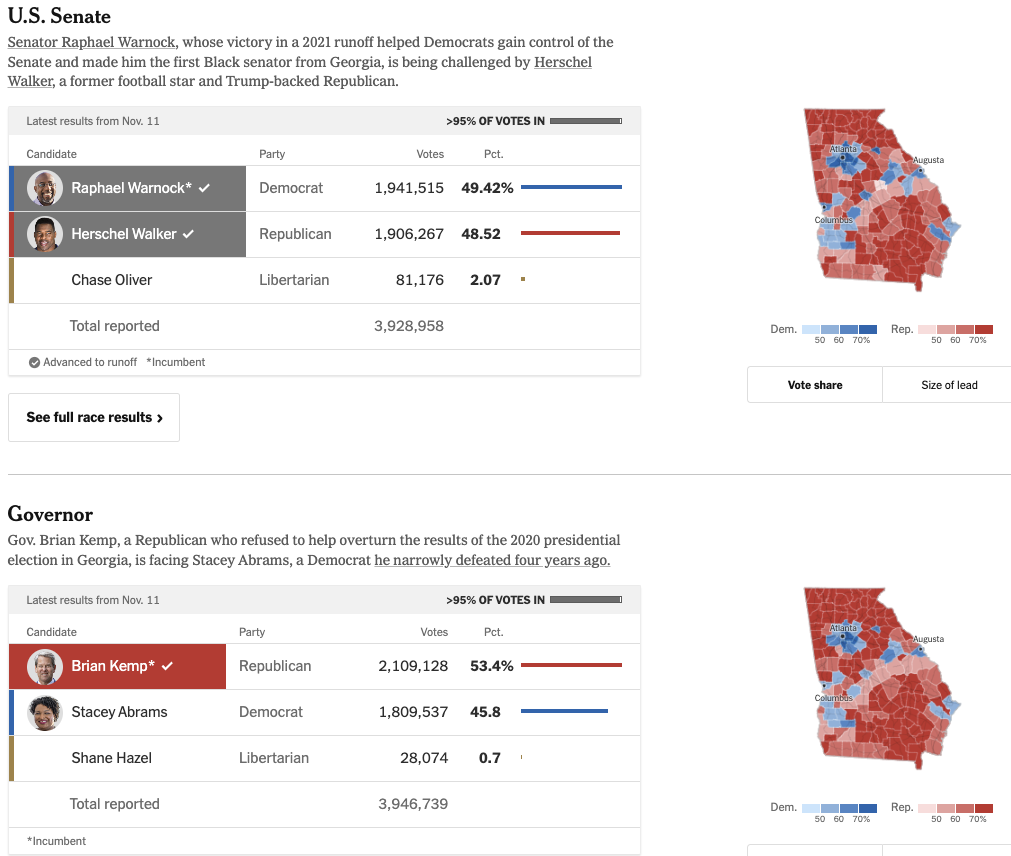
With 95% of the votes counted, Warnock had 131,978 more votes than Abrams while Kemp had 202,861 more votes than Walker. Then again, Walker, who is one of the worst Senatorial candidates in the history of Senatorial candidates, got roughly 100,000 more votes than Abrams.
But there are at least two other factors that come to mind.
First, both Warnock and Kemp were incumbents. Maybe voters simply thought they deserved to keep their jobs?
Second, the stakes are simply different. Georgians famously voted Democrat in both of the Senate runoffs in January 2021, giving that party the 50-50 margin needed for Vice President Harris being able to break ties. They’re poised to give the party a 51-49 margin if they re-elect Warnock in the runoff. It’s quite possible that they want a conservative Republican in their statehouse but prefer President Biden to Trumpers for running the national government.

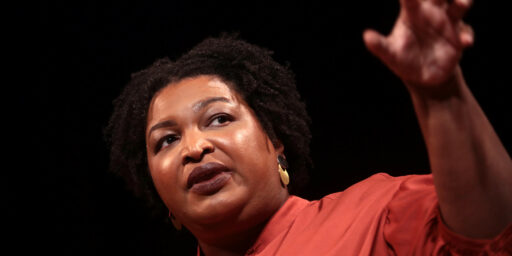
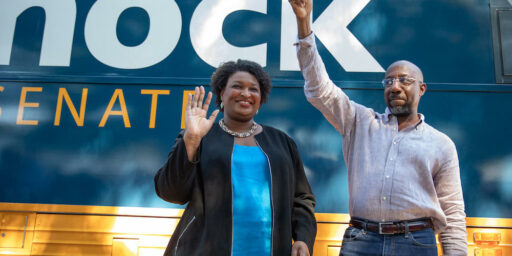
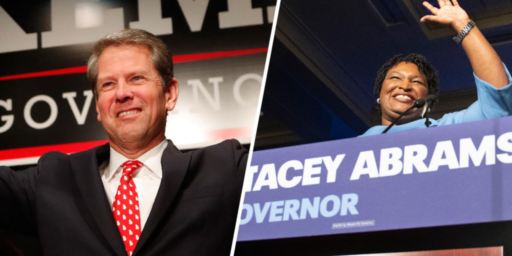

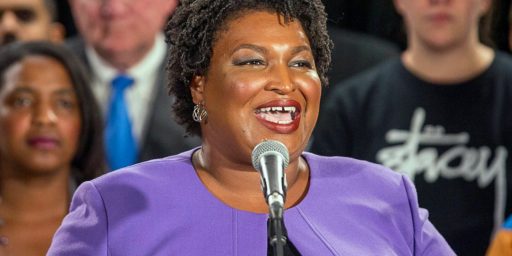
Or maybe Herschel Walker was a really bad candidate, it needn’t be any more complicated then that.
(Speaking of complicated, Occam’s Razor says Walker was bad is a pretty simple explanation – which also fits the trend we saw nationally of right wing kooks doing poorly).
Another factor is this: If you lose once, you really need a compelling reason and a changed environment to run again. This is the same for Beto O’Rourke in Texas. Very little has changed in Georgia or Texas. Lightening rarely strikes twice. Applies to Donald Trump also. For most politicians running for a high office, it is one and done.
@Scott: I think that’s right. Then again, Joe Biden won the Presidency on his third try.
Kamala Harris has been a real disappointment as VP. If there a way to swap her for Abrams it would be a real plus to the ticket.
@Scott:
Donald Trump has done plenty of losing. Although, as it turned out, we really did have Dick Nixon to kick around some more.
@charon: Yea, but it was six years after Nixon lost the California governor’s race and huge changed political environment due to the Vietnam War. He had time to remake his image and earn some new cred.
Incumbency is large factor, particularly for Kemp. Georgia as a state, is prospering. Kemp is solidly at the center of R political culture, so there is no reason for Rs and R leaning independents, not to vote for him. Kemp being a known and broadly viewed, as a successful governor, gave reasons for persuadable independents to vote for him.
The incumbency argument is more tenuous for Warnock, given concerns as to the direction of the country at large, but in Walker, R’s put forth an extreme and polarizing candidate. This opened the political center for Warnock, who was able to demonstrate that he was the moderate in the election and who most broadly reflected Georgia’s values. When the vote is broken down, we’re likely to see that Warnock motivated the Dem base and captured the persuadable independents and likely some chamber of commerce Rs.
Abrams’ base motivation strategy was always risky. Motivating the base is a great idea if there is evidence that there are sufficient non-voters that agree with you, but that was never evident in Georgia. At the end of the day, she didn’t offer enough to the non-Dem voter to capture them.
@MarkedMan: In what way has Harris been a disappointment?
While I’m not disputing any of these explanations, I should note that there was significant ticket-splitting between Senate and governor’s races around the country. Josh Shapiro did better than John Fetterman. Catherine Cortez Masto did better than Steve Sisolak. Mark Kelly did better than Katie Hobbs. Chuck Schumer did better than Kathy Hochul.
Obviously there are specific factors in each of these races (incumbency probably explains a lot of it), but the fact that there are so many examples is interesting in itself, given how rare ticket-splitting has become in recent times. There’s no question many voters were paying attention to the candidates, and not just their party affiliation.
All of the above, but what @charon: said, mostly Herschel Walker.
@Tony W: I can’t think of a single issue she has focussed on and actually made progress on. Since Mondale, Democratic VP’s have had signature issues that were important and that they continuously worked on and delivered. In the early days Biden gave her two. First, was a softball – high speed wi-fi to underserved and rural communities. The second was “training for president” level – the border problem. She has been completely MIA on both, and she hasn’t picked up anything else in its place. Basically she campaigns and makes connections, in the vein of historic and current-day Republican VPs.
@MarkedMan: This is baffling….
Kamala won proper national visibility elections. And… what on earth can you judge “disappointment” in the position of a US Vice President, a post of no direct power.
And you want to replace Ms Harris with someone idealised by the Lefty Left core, but who’s not had success outside of core.
Brilliant strategy… brilliant.
You rather need more of Warnock or Fetterman, people with skills on flipping floating margins.
@James Joyner:
IMO, there are too many factors involved for hard and fast rules.
For instance, would Biden have run in 2020, or still even have been active in politics, had he not been Obama’s VP for 8 years?
Beto, BTW, looks to me like someone hungry for an elected position, any position. So he runs for the Senate, then for the presidency, then for governor. Next I expect he’ll run for a seat in the House, or the Senate again. And at some point he tiehr wins or donors get tired.
Everyone here, just stop and think about that for a minute. Let that roll around your mind…
Some of us here were alive for the end of (legally enacted) Jim Crow. Many of you weren’t.
That idea is going to bounce around my Luddite brain for quite awhile. Thanks for the (unintentional?) sisebar, Dr. J!
This below from the 18 October arty brings to mind an observation I believe I read on Kevin Drum’s blog about a difference in two different Left political approaches, the Activist approach aimed at mobilising and drawing more on the campus academic culture, and the Organiser, drawn from the milieu of the Trade Union organiser (and similar) aimed less at mobilising and more at organising coalition. The Fetterman demarche like the Warnock demarche appear rather more in the Organiser mode.
Rather as it would be smart to rebuild Trade Union skills (and I say this as someone having no love at all for Trade Unions, not in the least, but…), in an era of vary narrow margins in the Competitive Geographies, it seems prudent to consider the Organiser approach is more prudent than Activist for turning in improved win-loss ratios.
@MarkedMan:
I agree that Harris has been a disappointment, and it’s interesting that the Biden administration hasn’t done much to try to dispel that sentiment. But ultimately, we just don’t know – the press seems strangely incurious with only occasional reports about the stuff that Harris does and much of that reporting is not flattering.
Biden was clearly part of Obama’s national security team and he was added to the ticket in part to compensate for Obama’s lack of FP credentials. Although Biden’s views were frequently overruled, he was there as part of the process with real input and learned first-hand the challenges of the Presidency. Is that happening with Harris – is she sitting shotgun so she can learn and provide input? Maybe, but it sure doesn’t look like it.
Also, I would not support Abrams as VP. She has zero foreign policy experience, probably even less than Sarah Palin. She has no government executive experience. She has not been successful in running for any major office. Her skills are really narrowly tailored around the things she’s been doing since losing her first try for governor. At the political level, I’m skeptical Biden needs that skillset to win reelection, but it might help. More importantly, though, is that Biden is old with a non-trivial chance to die in office. If Biden runs again, the VP needs to be someone who can take over and manage our complex foreign policy as well as the federal government itself. I don’t think Abrams is that person. I think her skills – organizing and fundraising – are much better matched for a seat in Congress than the VP and President.
@Flat Earth Luddite: I turn 57 later in the week and both the Voting Rights Act of 1964 and the Civil Rights Act of 1965 (barely) predate me. Brown was more than a decade earlier but was litigated for quite some time. So, de jure discrimination has been illegal all of my lifetime and more-or-less gone in fact since I’ve been following politics but, yes, still within living memory.
As for the article in the OP itself, it’s written by a “culture” journalist, which I think explains why it’s more about the vibes than a serious look at why Abrams lost.
About a month ago, I remember reading that Abrams was doing poorly with black men compared to Warnock and that she could not afford to lose that demographic. We’ll have to wait and see the demographic breakdowns for the votes to tease out if that was true, along with any other pertinent results or conclusions.
Probably more to do with Kemp. He’s pretty low-key and not out there like DeSantis. Just my experience in Georgia, but plenty of moderates seem to like the place (including Atlanta) and aren’t up to their necks in the stuff that gives you DeSantis or the New York suburbs.
It’s hard to undersell how bad the national GOP vibe is. DeSantis tricking migrants into a flight and then defenders being oh big deal, he dropped them off in Martha’s Vineyard instead of Boston. That is abusive behavior and normal people don’t get off on that and don’t need to defend it. I suspect that Kemp is an average guy who gets this.
@Lounsbury: As I explained just above, the tradition of Democratic VPs since Mondale is that they take one or at most two signature issues and run with them, with the blessing and support of the President. Kind of training-for-the-Presidency tasks. You are correct in that these are designated rather than constitutional duties, so you get a prize.
So how does a loudmouthed ignoramus like Marjorie Taylor Greene get elected in Georgia with 65.9% of the vote?
@CSK: With the exception of the 7 states that have only one Representative, House candidates are simply a different animal. They run in a district that’s typically not competitive on a party basis, so winning their primary is the only hurdle.
@James Joyner:
Thanks. She certainly is distinct from her R and D counterparts in any Georgia office.
This crowd seems to under appreciate the calculus of Statewide and National elections in that–there is a Lowest Common Denominator voter that must be appealed to.
The LCD voter is not a “policy guy/gal”. They vote on how a candidate makes them feel–often gauged on the most superficial of factors or events. (i.e. the people that knew Trump was their guy when he rode down the escalator.)
Superficially, SA is not the most physically attractive candidate which is a barrier for a female candidate without some counter-balance of charisma/personality. Not sure about SA in private– but her public persona does nothing to suggest she has a fun side to her. She would make a helluva WH Chief of Staff or Cabinet Sec’y–but simply with struggle with the politics of elected office. It’s not hard to fathom from the political side how she would have a problem connecting with “Jawja Man/Woman”
She had a sound theory of the case: Turning disengaged voters into likely voters but I believe she personally couldn’t execute against her targets: Black Men and Rural Voters. The LCD voters in these populations simply aren’t going to find common cause with someone as intellectually and academically accomplished as her. It requires the ability to project some self-effacing humor and “street acumen”, which, for obvious reasons, it isn’t appropriate or smart for Black women to be in the habit of. Her program is good–she just needs to find the right lead singer.
“She has zero foreign policy experience, probably even less than Sarah Palin.”
Not true. You can see Cuba from Georgia. Anyway, people should look at the ad by Marie Perez who won the WA election that was thought going to the Trump candidate. Less high minded intellectual argument and more down to earth kitchen table stuff.
https://twitter.com/MorePerfectUS/status/1591595756732809216
Steve
@Jim Brown 32:
She couldn’t get it to pay off for her, but I’ve sent money to her Fair Fight organization which I believe will be her legacy. More enfranchisement = better representational democracy = equal America’s promise.
@James Joyner: @CSK: I’d add that you have to consider the partisan lean of a district. Boebert’s race was surprisingly close (and it still hasn’t been called), but her district is merely R+7. Greene’s is R+28.
There comes a point when it becomes practically impossible for the other party to pick up a district. Where that point is is hard to say. In 2018 the Dems picked up an R+14 district. It snapped right back to the Republicans in 2020, though.
And there’s always an element of self-fulfilling prophecy. I watched part of the debate between Greene and her Democratic challenger. It was as painful as you can imagine: she came off as a ranting, raving lunatic, but he came off just kind of bland. It’s a thankless role: you run in a race you’re very unlikely to win. That means that candidates of quality are unlikely to bother entering such a race, and nobody’s likely to give a penny to whoever does enter.
Of course every now and then miracles happen, like Mary Peltola in Alaska or Doug Jones in Alabama. But even those don’t defy gravity to anywhere near the degree of a Dem defeating MTG in her district. Alaska and even Alabama aren’t anywhere near R+28.
@Jim Brown 32:
Quite aside from specifics, some people are far better suited to be Eminence Grises than Front Person. (Madame Clinton an example). Perhaps her.
@MarkedMan: “Tradition since Mondale” is hardly a tradition. Bollocks as a point.
@Andy:
the wisest item, real data.
Abrams and O’Rourke need to stop running for office for a while. Voters rarely give a losing candidate an immediate return. Biden went a long time between his failed Presidential runs and the successful one, and willingly spent time as a second fiddle in between (then took a complete cycle off and mostly out of the public eye). Abrams and O’Rourke keep losing, and never seem to be off-stage long enough for people to think they need to give them a second look.
You can add a fair bit of misogyny in to Abrams issues as well. It’s not right, or fair, or just…but it is. I often felt that Hillary Clinton suffered the same problems. Both misogyny and never being out of the public eye long enough to give people a chance to “come back” to her, regardless of actual qualifications.
I wish Abrams would take over the DNC for a few cycles. She’s a fantastic organizer and outstanding at getting out the vote, but it’s not really a public facing position. Would serve her and the Democrats well, I feel.
Abrams is a woman. I continue to think that people underestimate the significance of this as a factor.
It often isn’t even a conscious decision, people say things like “I just don’t see her in that role.”
Is it the ONLY issue? No. Is it an issue? Sure. Even some of the Kamala hate can be attributed to this.
@Jen: There are 12 currently serving and/or just-elected women governors. Three others resigned to go into the Senate (Maggie Hassan) or the Cabinet (Nikki Haley, Gina Raimondo). Granted, that’s less than half their representation in the general populace but it’s a huge number.
@Lounsbury: Mondale was VP 45 years ago which, in my opinion, is long enough to constitute a tradition. If you don’t think it is, fine. But why do you have to be such an insufferable prick in virtually every comment you make?
@Andy: Andy, you bring up good points and they deserve a serious answer from me, and so I did, twice, and lost them both times due to a combination of fat fingering and general WordPress maliciousness. So, I’m just going to give up.
@James Joyner: I specifically said “a” factor, not “the” factor. If one is already on the fence about voting for someone, every little thing matters.
@MarkedMan:
I understand your frustration – I’ve lost many comments over the years. It’s super annoying when that happens.
@MarkedMan: 3 Democratic party presidencies as I recall. Sorry, perhaps in America that makes a “tradition” but it’s bollocks. Regardless, as far as I can tell this is a mere question of mediatisation rather than operational function, and in the circumstances of razor thin majority w Senate VP vote, first closing out pandemic and then the long tomfoolerly of intra-party dispute over what became the infrastructure win, I should very well not expect great attention to window dressing PR that I would rather suspect is more for the politically obsessed than general electorate.
As for prick, I really remain quite baffled by you people, calling a point bollocks is being a prick? I hear worse on my own statements on a daily basis to my face, I rather encourage it, if one doesn’t have someone saying something is bollocks, one totters on in self-deception never self-examining, and ends up investing in Crypto.